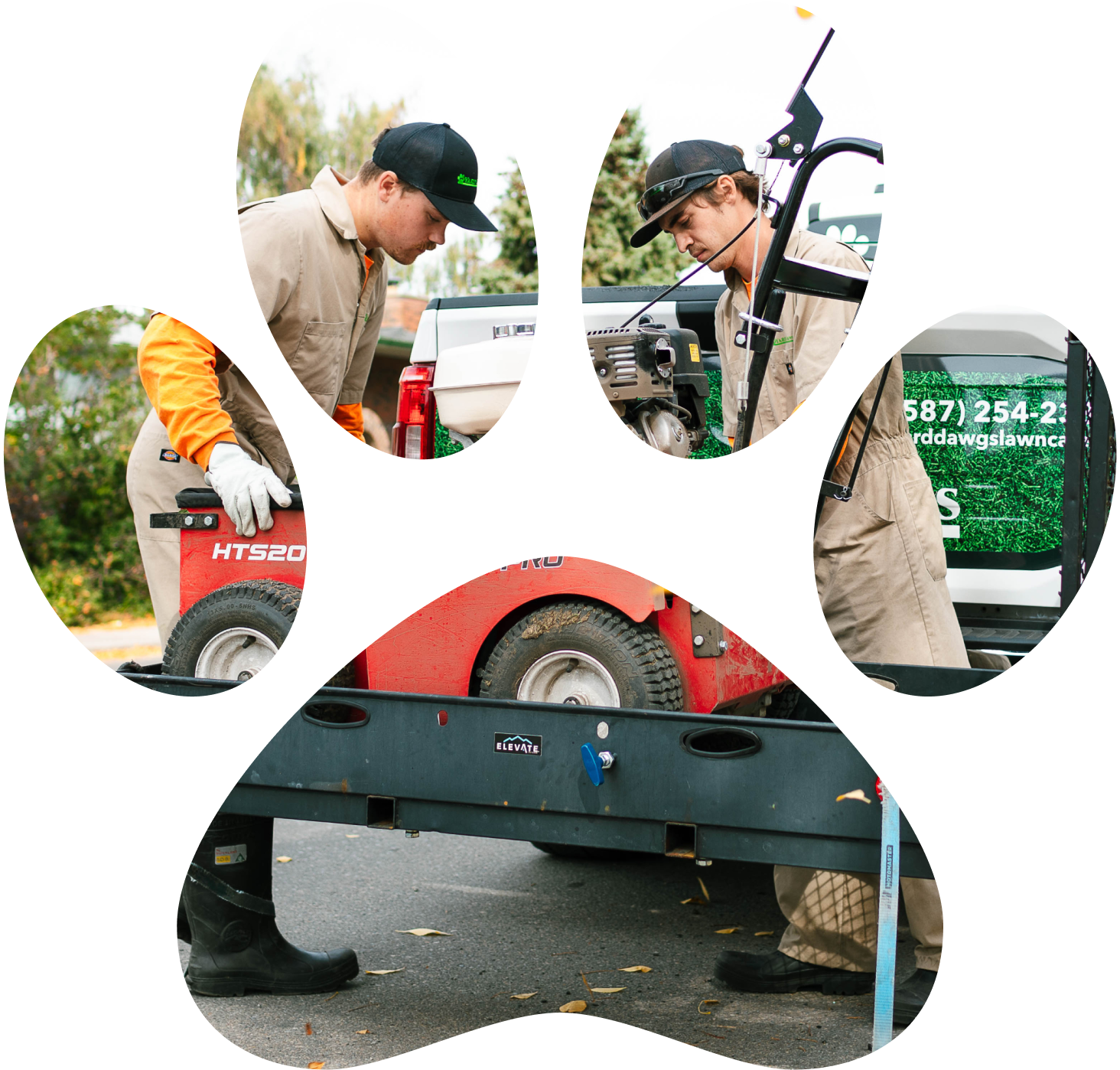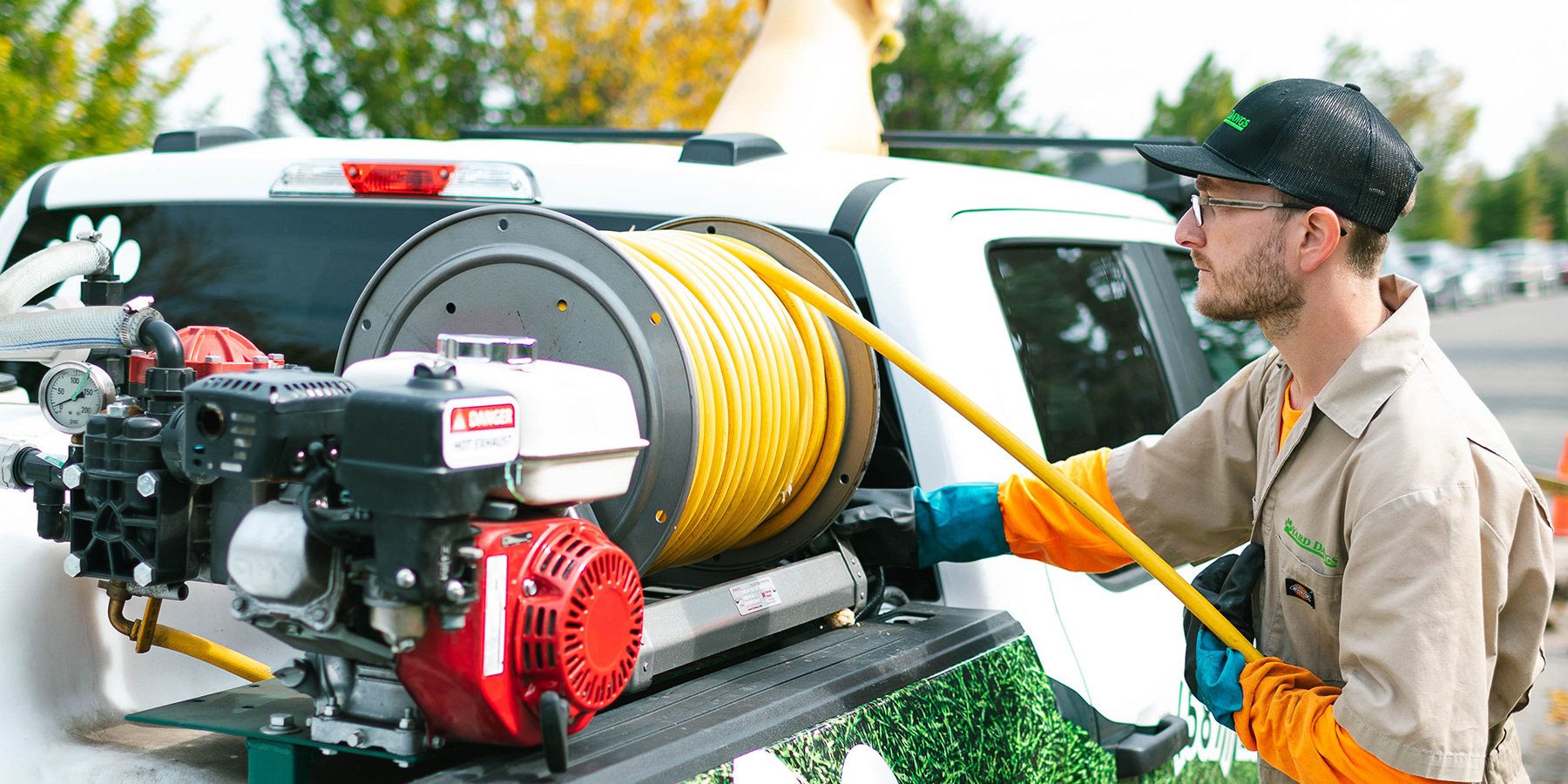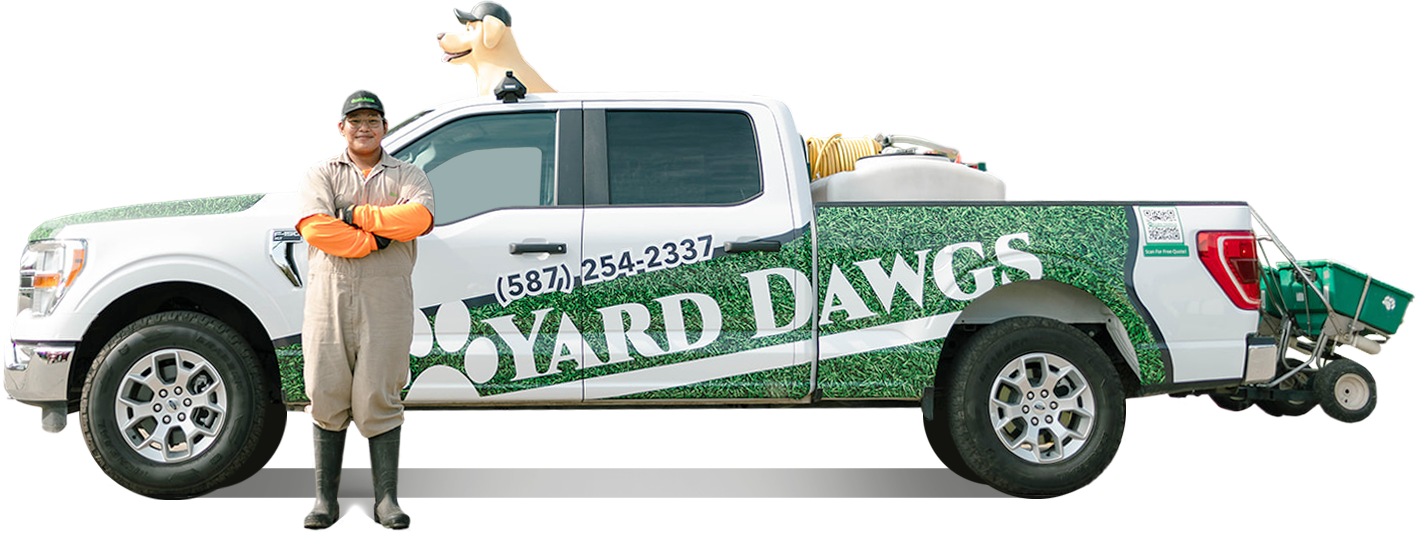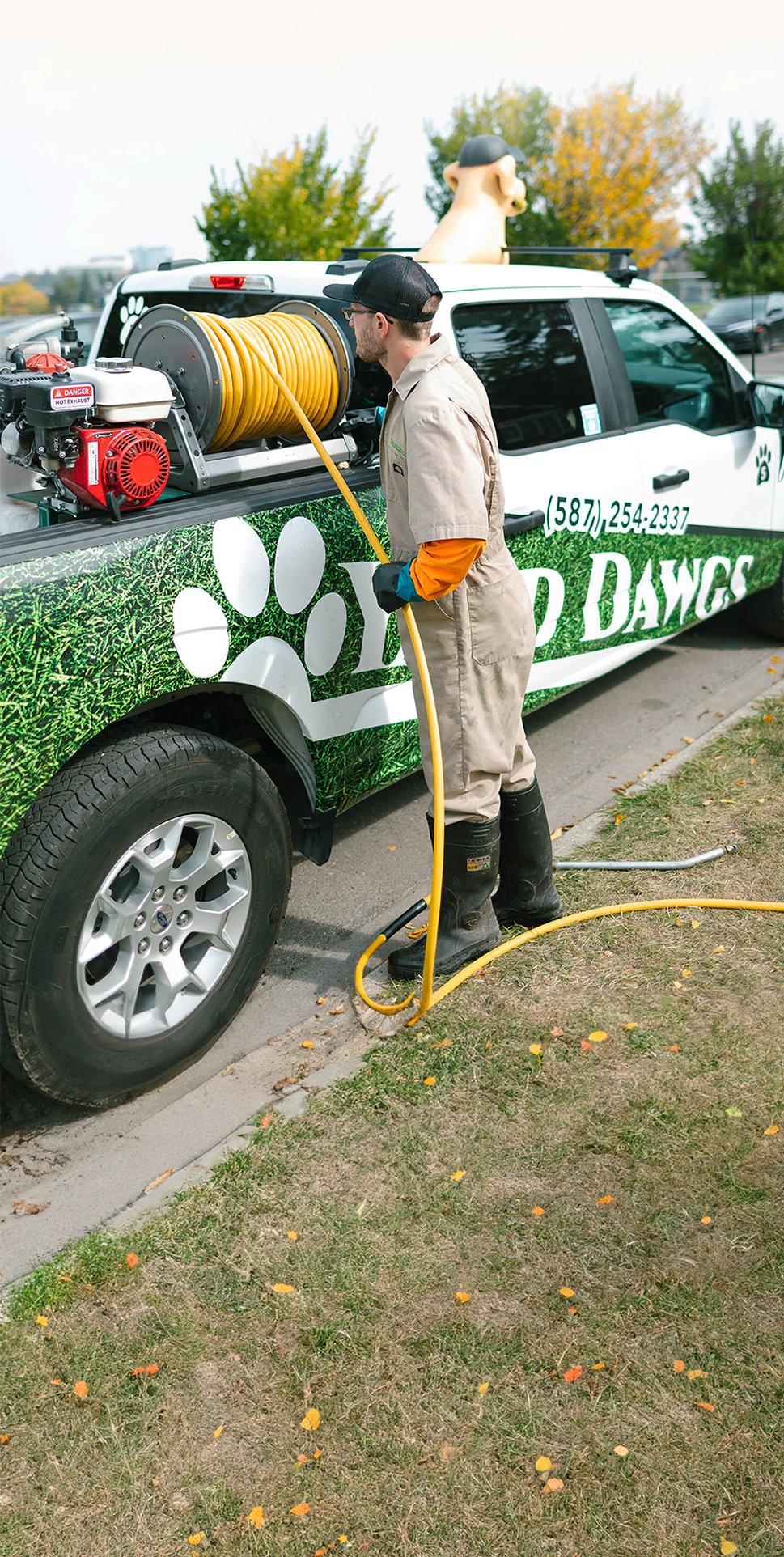Our work
Lawn care without the compromise

We will email you back within a few hours on a working day

Best prices
No hidden fees
Licensed techs
Free weed touchups
Best prices
No hidden fees
Licensed techs
Free weed touchups
Service details
Chinch bug treatment is critical for preventing these pests from causing extensive damage and keeping your lawn healthy throughout the season. If left untreated, chinch bugs can wreak havoc on your lawn, making early detection key to avoiding serious damage. Our chinch bug treatment is a liquid application that covers your entire lawn, providing effective protection.
With extensive experience providing chinch bug treatment in Calgary, we use proven products that are safe for families, pets, and our team. For best results, we typically recommend two treatments per season to effectively control chinch bug activity and protect your lawn.


Chinch Bug Control in Calgary
At Yard Dawgs, we provide professional chinch bug treatment services in Calgary. Our licensed technicians apply a full blanket treatment across your lawn, with added focus on areas showing active chinch bug infestation.
The damage caused by chinch bugs often resembles dry or bare spots, but it’s usually more random in nature. After applying our chinch bug treatment, you should see a significant reduction in chinch bugs, preventing further damage. However, it’s important to continue monitoring your lawn each season to ensure the pests don’t return.
Maintaining a healthy lawn with regular fertilization and weed control is key to keeping chinch bugs at bay. The healthier your lawn is, the less likely it is that these pests will infest it.
Still have weeds?
We stand behind our chinch bug treatments in Calgary and are committed to your satisfaction. If any issues arise, we’ll address them promptly and make it right.
Still have weeds?
We stand behind our chinch bug treatments in Calgary and are committed to your satisfaction. If any issues arise, we’ll address them promptly and make it right.
Take our lawn quiz
What is the most important to you?
When did you last get services?
What is your annual budget?
Add your email to view your results
Based on your score we recommend the
Results are in

Season long fertilizer
Unlimited weed control
Liquid fall aeration
Super juice
Sea kelp
DIY BarePatch Pro (Upon request)
Price for lawns up to 3,000 SF. GST not included.
Results are in

Season long fertilizer
Unlimited weed control
Liquid fall aeration
Super juice
Sea kelp
DIY BarePatch Pro (Upon request)
Price for lawns up to 3,000 SF. GST not included.
Results are in

Season long fertilizer
Unlimited weed control
Liquid fall aeration
Super juice
Sea kelp
DIY BarePatch Pro (Upon request)
Price for lawns up to 3,000 SF. GST not included.
Results are in

Season long fertilizer
Unlimited weed control
Liquid fall aeration
Super juice
Sea kelp
DIY BarePatch Pro (Upon request)
Price for lawns up to 3,000 SF. GST not included.
Results are in

Season long fertilizer
Unlimited weed control
Liquid fall aeration
Super juice
Sea kelp
DIY BarePatch Pro (Upon request)
Price for lawns up to 3,000 SF. GST not included.
Results are in

Season long fertilizer
Unlimited weed control
Liquid fall aeration
Super juice
Sea kelp
DIY BarePatch Pro (Upon request)
Price for lawns up to 3,000 SF. GST not included.

If you’d like immediate assistance give us a call at (587) 254-2337
FAQ?
Yes, chinch bugs are harmful. These insects suck the sugary sap from grass blades, injecting a toxin that prevents the grass from recovering. They prefer red fescue and Kentucky bluegrass, which are common in Canadian lawns.
It can be hard to tell the difference between chinch bug damage and drought damage. However, chinch bug damage is typically less uniform and tends to occur in random areas, while drought damage usually affects a larger, more even area.
Yes, our chinch bug treatment will reduce the chinch bug population significantly, preventing further damage. However, grass won’t recover immediately after the damage. We recommend getting a fall aeration and fertilizer package to help your lawn bounce back. By next spring, your lawn should be in much better shape with proper care.
We use a targeted insecticide liquid spray applied to the entire lawn to eliminate chinch bugs.
Once chinch bugs damage grass, it won’t grow back. The toxins from their feeding kill the grass blades, and they won’t recover. First, treat the lawn for chinch bugs, then follow up with care to help your lawn recover.
After spraying for chinch bugs, we recommend purchasing a lawn care package, including aeration or slit seeding. New grass should begin to grow within weeks, but it may take up to a year for your lawn to fully recover.
The most effective chinch bug treatment in Calgary uses targeted applications designed for local weather and lawn conditions. Our professional chinch bug control eliminates active infestations and helps restore healthy, resilient turf.
Professional chinch bug treatment addresses the root cause of the infestation, eliminating the pests and preventing them from spreading. Early intervention helps protect your lawn from further damage and promotes a healthier, lush lawn.
FAQ?
Yes, chinch bugs are harmful. These insects suck the sugary sap from grass blades, injecting a toxin that prevents the grass from recovering. They prefer red fescue and Kentucky bluegrass, which are common in Canadian lawns.
It can be hard to tell the difference between chinch bug damage and drought damage. However, chinch bug damage is typically less uniform and tends to occur in random areas, while drought damage usually affects a larger, more even area.
Yes, our chinch bug treatment will reduce the chinch bug population significantly, preventing further damage. However, grass won’t recover immediately after the damage. We recommend getting a fall aeration and fertilizer package to help your lawn bounce back. By next spring, your lawn should be in much better shape with proper care.
We use a targeted insecticide liquid spray applied to the entire lawn to eliminate chinch bugs.
Once chinch bugs damage grass, it won’t grow back. The toxins from their feeding kill the grass blades, and they won’t recover. First, treat the lawn for chinch bugs, then follow up with care to help your lawn recover.
After spraying for chinch bugs, we recommend purchasing a lawn care package, including aeration or slit seeding. New grass should begin to grow within weeks, but it may take up to a year for your lawn to fully recover.
The most effective chinch bug treatment in Calgary uses targeted applications designed for local weather and lawn conditions. Our professional chinch bug control eliminates active infestations and helps restore healthy, resilient turf.
Professional chinch bug treatment addresses the root cause of the infestation, eliminating the pests and preventing them from spreading. Early intervention helps protect your lawn from further damage and promotes a healthier, lush lawn.

Call us
Lawn Specialist
Chinch bugs are black with a white spot on their back, located between their wings. They are about 1/5 inch tall and resemble ants or mosquitoes. These pests feed by sucking sap from the crown and stems of grasses, especially bent grasses like bluegrass and red fescue.
Damage from chinch bugs typically occurs in sunny areas when temperatures exceed 30°C. The damage shows as irregular yellow patches starting in June and spreading throughout the summer. If left unchecked, the grass may turn brown and die. In severe infestations, chinch bugs can destroy an entire lawn.



